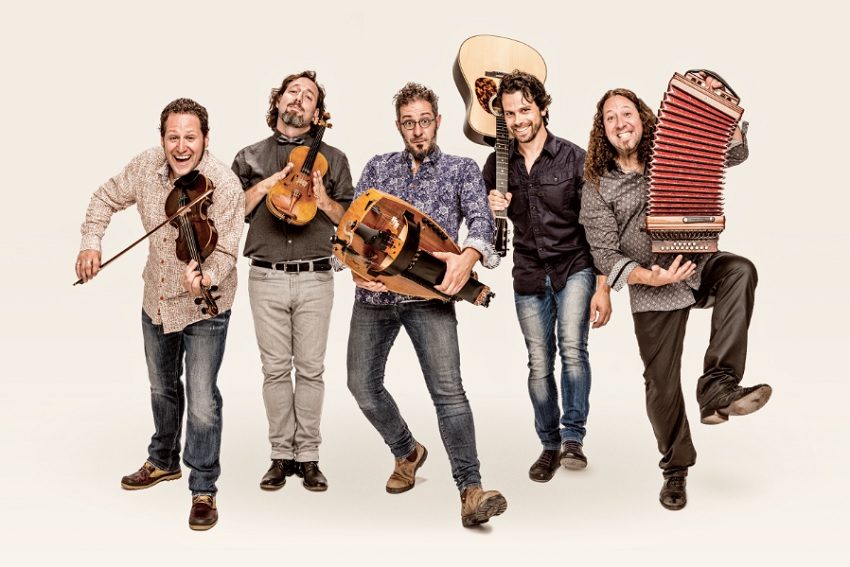Le Vent du Nord: French Canadian Folk Heroes

Quebec’s Le Vent du Nord celebrates their region’s culture and history by playing original compositions in French alongside folk songs from centuries ago.
This musical journey wasn’t always to be, according to fiddler and founder of Le Vent du Nord, Olivier Demers. He used to play distinctively American music but when studying music with the band’s co-founder Nicolas Boulerice the pair realised something was amiss.
“We were playing jazz and country music and we realised that we were playing traditional music from the United States,” Demers says. “We wanted to know about our own roots and it basically became a fascination and passion.”
Demers says the now five-membered band’s exploration of Quebecois history and song is an all-consuming odyssey of discovery.
“We jumped into this whole universe of traditional music, folk music, and we discovered good friends and superb music and very nice musicians,” he says. “It became a lifestyle because when you jump and embrace this kind of music, you don’t just play the music, but you embrace the way it’s transmitted and shared.”
Le Vent du Nord draws on Quebec’s deep cultural well for much of their repertoire, composing their own songs in a Celtic-folk style that includes centuries-old tunes as well. Performing with instruments including a hurdy-gurdy, piano accordion, jaw harp, guitars and fiddle, Le Vent du Nord’s sound is an evocative, sometimes raucous one.
Though the band plays songs written more than 400 years ago, Demers says they’re not trying to harken back to the old days. If the song has stuck around for this long, the reason for that is greater than nostalgia.
“If a song is transmitted 400 years, it’s because it talks about things that are still relevant. A lot of the time they talk about love, of course, but also missing somebody, a quest of some sort that you can relate to… We don’t look at ourselves as people who do music from the past like the past. We take from the past and we perpetuate and continue the moving tradition.”
It’s this connectivity to culture that Demers and his band are so keen to preserve. On a continent where English-speaking and American culture are almost all-pervasive, French Canadians must strive to maintain their cultural difference. And keeping that culture alive is important not just for the sake of album sales, but for the good of humanity, says Demers.
“You have to understand, to be a French culture in North America in a very Anglicised world, it needs to be fixed,” he says. “It needs to be understood that this place is a country, because we want to keep this alive, to preserve this culture and this way to laugh, and speak and cook and make love and interact between people. For us, losing a culture – whether it’s a Scottish or Catalan culture, any smaller culture – you lose a way to think. This way to think is simply another way for the brain to work, and this different way might bring a solution to a larger problem. We can create things differently because we live differently.”
Demers raises an example that Adelaide audiences will be familiar with. Cirque Alfonse, the Quebecois troupe behind shows Barbu and Tabarnak have their own distinct style of circus, which is informed by French Canadian culture.
“It’s more to preserve something unique, and that’s why when we play this music you will understand that we are different people,” says Demers. “The way we sing, perform, do our act is different.”
On the subject of Quebec’s independence from Canada, for which a referendum failed in 1995, Demers says he’s quietly hopeful that it will one day come about, but it will take time as the push for independence currently sits at a low ebb.
“Sadly we live in a very globalised life, where people eat the same things or see the same stuff on Facebook. I feel we’re maybe at the bottom of the barrel right now. But there’s still in Quebec probably 35 to 40 per cent of the population that is very proud and enthusiastic about this. We’re looking for 10 or 20 per cent of the population to join them and make sure this thing continues. There were other generations that were more involved, but I’m not negative. I’m very positive about the future. It’s just a question of time, and the leaders who will bring it up again one day.”
Yet, perhaps ironically, it is the globalised world that has brought Le Vent du Nord so much success. Touring the WOMAD circuit this year, and having toured across five continents for thousands of shows in the band’s career, Le Vent du Nord finds an audience all across the globe.
“I think the people who come to see Le Vent Du Nord in every country are the people who are open to difference and interested to see it,” Demers says. “Of course, if you don’t understand the lyrics, you might say, ‘I won’t go see it’, but if you move past that, it’s like you go to see a Cuban band or something. You might not necessarily understand the lyrics but you can dance to it, enjoy the culture and see where they’re from, they’re warm and have gathered together to play the music.
“You will understand that our music is played in the villages and the houses, sung and shared by people in their living rooms. You will see that.”
Le Vent du Nord will play WOMADelaide on March 11 & 12
WOMADelaide
Botanic Park
March 9-12
womadelaide.com.au